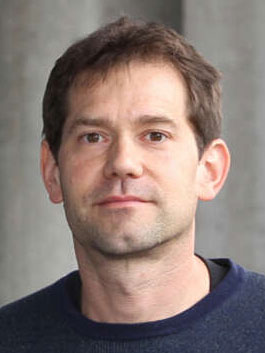 Peter Scheiffele
Peter Scheiffele
Biozentrum, University of Basel, Switzerland
https://www.biozentrum.unibas.ch/
https://twitter.com/peterscheiffele
Invited by Elena Baz Badillo (Thoumine’s team)
Title
Molecular Mechanisms of Neuronal Circuit Development and Plasticity
Abstract
Neuronal circuits represent an impressive example of a complex, highly organized system. Circuit assembly and plasticity rely on cellular recognition events during development that specify synaptic connections and the exchange of signals that modify synapse density in the adult. We are testing the hypothesis that alternative RNA splicing is a central mechanism for the amplification of molecular diversity that drives synapse specification in mice. I will discuss recent work from the lab on synapse-specific functions of individual splice variants of synaptic proteins in synapse specification and our efforts on examining how spontaneous sensory experience modifies alternative splicing programs in developing cortical networks. In the second part of the talk, I will discuss recent findings on an unexpected role for a developmental morphogen in controlling excitation-inhibition balance in mature cortical circuits.
Key publications
1. Takatoshi Iijima, Karen Wu, Harald Witte, Yoko Hanno-Iijima, Timo Glatter, Stéphane Richard, Peter Scheiffele. SAM68 regulates neuronal activity-dependent alternative splicing of Neurexin-1. Cell, 2011; 147(7):1601-1614
2. Stephane Baudouin, Julien Gaudias, Stefan Gerharz, Laetitia Hatstatt, Keiku Zhou, Pradeep Punnakkal, P; Kenji F Tanaka, Will Spooren, Rene Hen, Chris I. De Zeeuw, Kaspar Vogt, Peter Scheiffele. Shared Synaptic Pathophysiology in Syndromic and Non-syndromic Rodent Models of Autism. Science, 2012; 338(6103), 128-32.
3. Dietmar Schreiner, Thi-Minh Nguyen, Giancarlo Russo, Steffen Heber, Andrea Patrignani, Erik Ahrné, Peter Scheiffele. Targeted Combinatorial Alternative Splicing Generates Brain Region-Specific Repertoires of Neurexins. Neuron, 2014; 84:386-98.
4. Lisa Traunmüller*, Andrea M. Gomez*, Thi-Minh Nguyen, and Peter Scheiffele. Control of neuronal synapse specification by a highly dedicated alternative splicing program. Science, 2016, 352: 982-986.
5. Oriane Mauger, Frederic Lemoine, and Peter Scheiffele . Targeted intron retention and excision for rapid gene regulation in response to neuronal activity. Neuron 2016, 92(6):1266-1278
6. Elisabetta Furlanis*, Lisa Traunmüller*, Geoffrey Fucile and Peter Scheiffele. Landscape of ribosome-engaged alternative transcript isoforms across neuronal cell classes. Nature Neuroscience. 2019; 22(10):1709-1717.
7. Hanna Hörnberg, Enrique Perez-Garci, Dietmar Schreiner, Laetitia Hattstatt-Burklé, Fulvio Magara, Stephane Baudouin, Alex Matter, Kassoum Nacro, Eline Pecho-Vrieseling, and Peter Scheiffele. Rescue of oxytocin response and social behavior in a rodent model of autism. Nature 2020; 584(7820):252-256.
8. Andrea M. Gomez, Lisa Traunmüller, Peter Scheiffele. Neurexins: Molecular Codes for Shaping Neuronal Synapses. Nature Reviews Neuroscience 2021, 22(3):137-151.
9. David Hauser*, Katharina Behr*, Kohtarou Konno, Dietmar Schreiner, Alexander Schmidt, Masahiko Watanabe, Josef Bischofberger, Peter Scheiffele. Targeted proteoform mapping uncovers specific Neurexin-3 variants required for dendritic inhibition. Neuron 2022, 110(13):2094-2109.
PhD seminars are organized by the NBA, Bordeaux Neurocampus, and the Bordeaux Neurocampus Graduate Program


